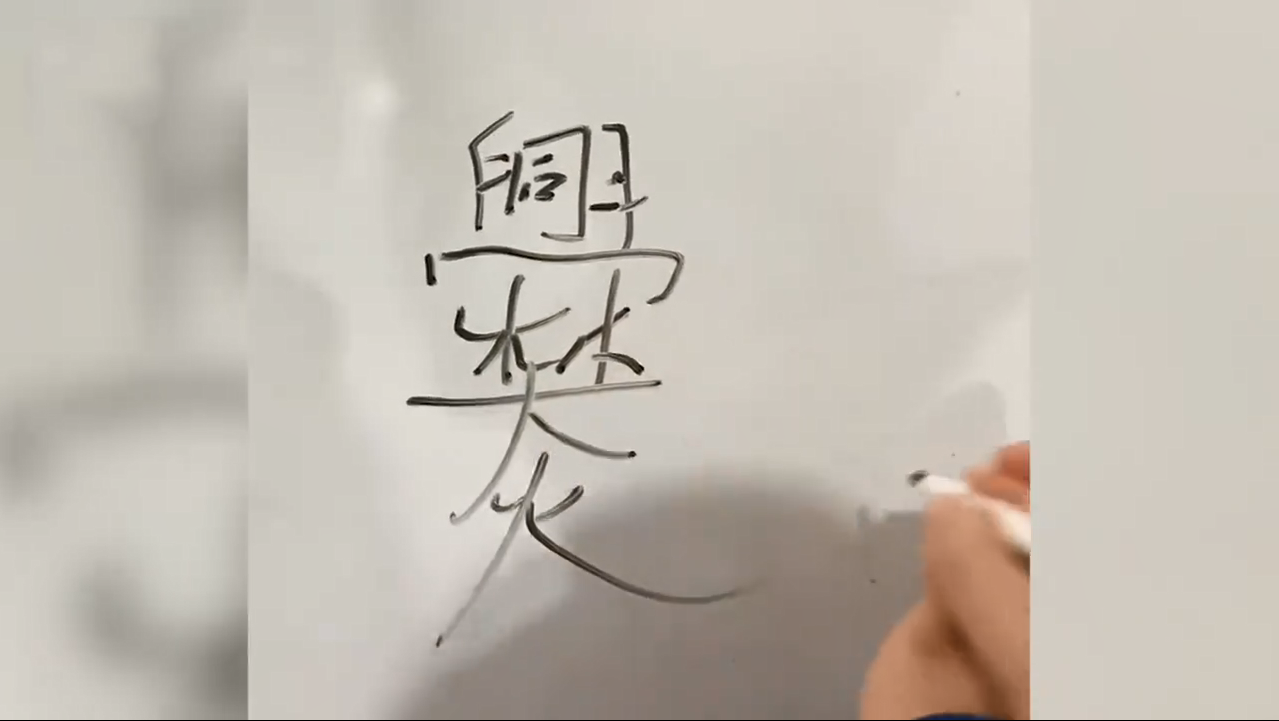Quick comments 丨 Church the son of the surname of the surname collapsed when he wrote the name?No matter how hard you write, you don't need to regret it
Author:Red Star News Time:2022.09.27
Teaching children's surnames patiently and letting children patiently learn their surnames is both a basic ability and a process of appreciation of history.
Recently, a woman in Henan showed her videos of teaching her names, which caused heated discussion among netizens. The video showed that the woman held the child's hand and taught him to write a name. The strokes of "爨" were complicated. The woman collapsed very much. The text said: "I regret finding a father of the surname 爨, your last name is really hard to write.

The number of strokes in cuàn is 30 paintings, which is indeed an uncommon surname, and one of the surnames with more strokes. In the face of such a difficult surname, netizens have conducted warm but not necessarily reliable discussions, which can be roughly divided into these opinions: first, ridiculous, difficult to add difficulty, named "Yiyi Xi", etc., and arrange The paragraphs such as "” ”" and "等"; second, sympathy, it is recommended to name "爨 一", and the surname cannot be changed, so it is a bit simpler. surname. Of course, more people still say that for the first time to know such a complex last name.
In fact, 个 is a surname with a long history in China, and was first seen in the Warring States Period. "Warring States Policy" mentioned "Wei Youxiang Xiang". Later generations believe that "the first of the puppets." Regarding the original meaning of 爨, the "Said" explained, "The cooked cooked." The three are both. "The interpretation of the word is summarized: cooking rice; training of stoves, crickets, and cooking. There must be cooking people on the stove.
Although the word is related to cooking, it is the surname of the official position. During the Warring States Period, the Battle of the Beibei was an important battle between the Sanjin. Xiang Xiang was Wei General, and the uncle of the general general defeated the Han Zhao coalition in this battle with the general uncle acne, and received 100,000 acres of Tian. This is the earliest land, in the Yuncheng area southwest of Shanxi today. Later, the Qi family moved to the south, and in the five years of Emperor Emperor Xiankang (AD 339) to the seventh year of Tang Xuanzong Tianbao (AD 748), it ruled the name of the South China Central (now Yunnan, Western Guizhou and Western Guizhou and other names. Southwest Sichuan), more than 400 years, created a splendid culture. Today, the "Dragon Monument" preserved in the Xueguanbao Temple in Lu Liang, Yunnan is the remains of the culture. This ancient monument not only occupies an important position in the history of Chinese calligraphy, but also has important historical value.
It should be said that a father and husband of the surname should not only "regret", but also feel proud, especially "regret" with "difficulty writing". We know that the surname was a symbol that marked the relationship between the clan or social blood at the beginning of it. However, with the development of history, it has carried a lot of information about the blood map, family evolution, and the era of the times. As a cultural symbol, the connotation it contains is very rich, such as the social construction of the characteristics of power, status, respect, humbleness, expensive and low, and home and national; as an institutional culture, its comprehensive cultural characteristics are very very very very very very very very characteristic. Obviously, the consciousness of ethics, morality, ancestral worship, and clan system advocated by ancient China was fully reflected in the culture of the surname.
As an important part of the national culture, the surname has a powerful bond function and is the group symbol of the social people. The cultural significance given by it allows each descendant of Yanhuang to find their own historical destination. Today's society and economy are developing rapidly, cultural ideas are more diverse, and surname culture also shows new cultural connotations. The surname is not only a symbol of the family as a member of the family, the spiritual bond and cultural logo of the family, but also the symbol of the sense of belonging and national identity of the individual.
"Four generations in the same hall and the fifth generation", the blood of the ancestors has been circulating for thousands of years. If it is only because of "difficult to write", it is not pity to change the surname of Yi? As a result, if more rare surnames change their surnames because of "difficulty writing", wouldn't it be a loss of traditional culture? Teaching the child's own surname patiently, and letting the child's patience learn his surname is both a basic ability and a process of appreciation of history.
Edit Wang Yitao
- END -
It's amazing!Chinese students appear at the graduation ceremony ...

recentlyA young lady studying in CanadaVideo of wearing a Chinese service to parti...
Tianshui: Reading hot books in the summer, growing with hot books

On August 16th, many students were reading carefully at the Democratic Road Democr...